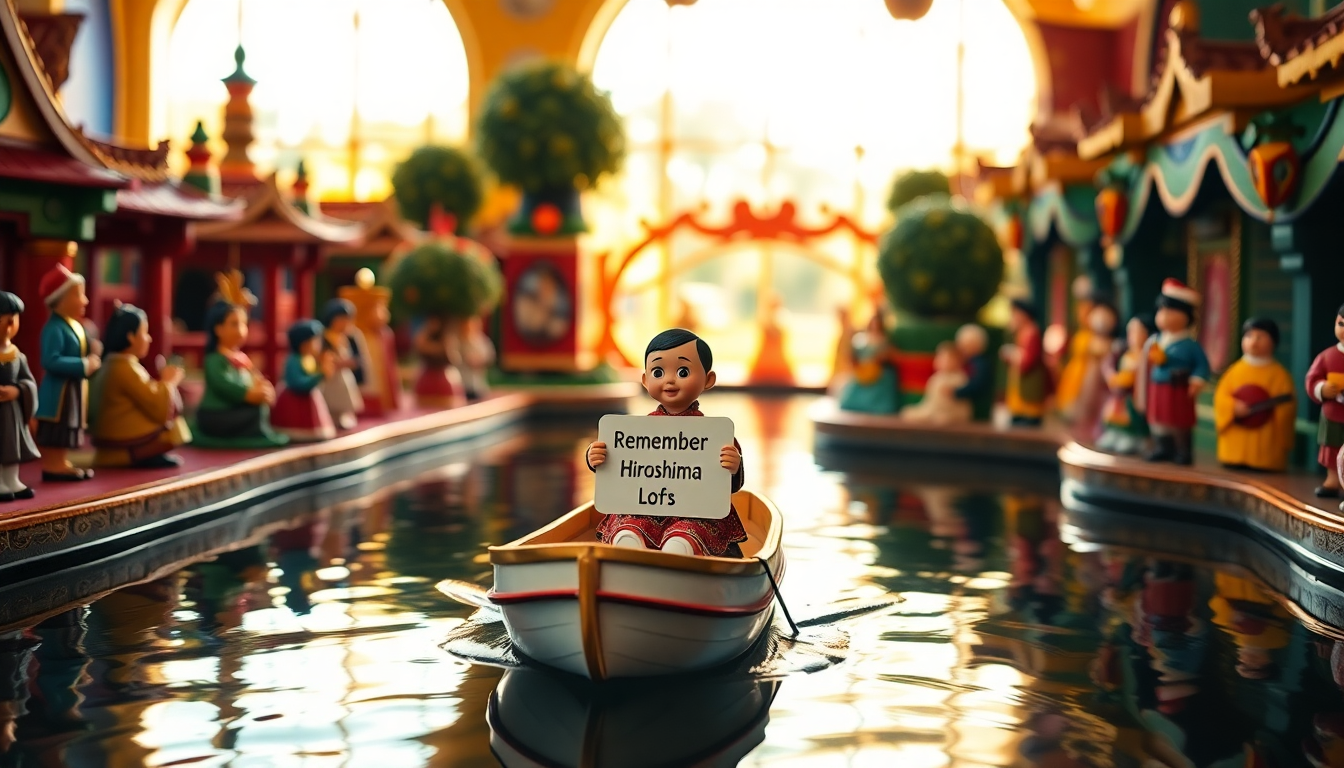Table of Contents
Over the weekend, something unexpected happened at Disneyland that caught the attention of both park guests and online audiences. A doll, strategically placed in the iconic “It’s a Small World” ride, held a sign reading “Remember Hiroshima.” This surprising display stirred up a wave of curiosity and discussions about its political implications. Not only did it disrupt the cheerful vibe of one of the park’s favorite attractions, but it also served as a powerful reminder of past horrors and a critique of current military spending.
What’s the Story Behind the Protest?
This protest was orchestrated by none other than Ben Cohen, co-founder of Ben & Jerry’s. He launched it as part of his “Up in Arms” campaign, which aims to challenge the staggering budget allocated to the U.S. military and its impact on global conflict. With the 80th anniversary of the Hiroshima bombings just around the corner, Cohen’s message couldn’t be more timely. He urged the public to remember the horrific consequences of atomic warfare and reflect on the moral responsibilities tied to such a history.
Cohen made it clear that placing the doll in a setting meant to celebrate unity was a deliberate choice. The “It’s a Small World” exhibit, known for its theme of togetherness among children from different nations, stood in stark contrast to the message of the sign. He stated, “We were supposed to remember what we did there and say, ‘Never again.’ And we’ve ignored that.” This powerful juxtaposition amplified the urgency of his message, especially in light of ongoing conflicts, like the situation in Gaza.
As videos of the doll circulated on platforms like TikTok and Reddit, many viewers were left questioning not just the message but also how such a protest could even happen in a place that usually has strict security measures. This incident sparked conversations about the limits of political expression in family-friendly environments and how public spaces can either promote or suppress dissent.
Understanding Military Spending and Historical Context
The protest highlights crucial conversations happening right now, especially with the U.S. military budget nearing a jaw-dropping $900 billion. Cohen criticizes this figure for diverting funds from essential social services, arguing that such spending perpetuates cycles of violence while ignoring the humanitarian needs of people both at home and abroad. He views the ongoing war in Gaza as a clear example of a larger moral crisis where the consequences of military actions are often brushed aside.
Adding to the complexity of Cohen’s message is the historical context of Hiroshima. The bombings during World War II led to over 100,000 deaths and are a significant moment in history—a cautionary tale against the use of nuclear weapons. Cohen’s actions serve as a wake-up call to reflect on the ramifications of military decisions and to push for a more compassionate approach to foreign policy.
Cohen’s activism isn’t new; he’s long been engaged in political protests and social justice advocacy. His previous campaigns have raised awareness about issues such as climate change and economic inequality, showcasing his commitment to using his platform for social change. This latest protest fits into a larger narrative that advocates for reallocating resources toward initiatives that foster peace and well-being instead of warfare.
How Are People Responding?
The public’s reaction to the protest has been mixed. Some have shown support for the message, while others have questioned the appropriateness of such demonstrations in a family-friendly setting. Disneyland officials were quick to respond, removing the doll and reminding guests about the park’s rules regarding political statements. This swift action underscores the delicate balance that public spaces must maintain between allowing free expression and ensuring a welcoming environment for all visitors.
As discussions continue to unfold on social media and beyond, this incident serves as a reminder of the power of symbolic acts in raising awareness and sparking dialogue around critical issues. The timing of the protest, coinciding with the anniversary of Hiroshima, emphasizes how important it is to remember history when shaping contemporary discussions about military policy and humanitarian efforts.
Looking ahead, Cohen plans to keep his campaign going over the next four years, advocating for a reallocation of military funds toward social programs that address the needs of everyday Americans. His call for compassion resonates with many who envision a more peaceful and equitable world, underscoring the idea that a society’s true worth is measured by how it treats its most vulnerable members.


